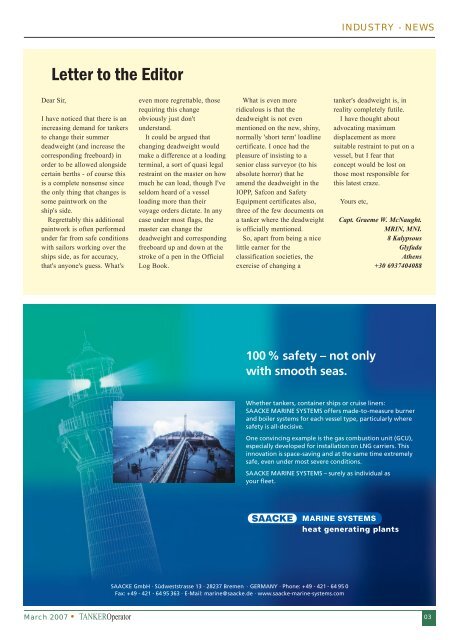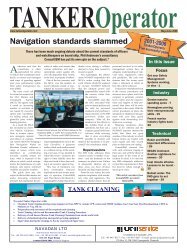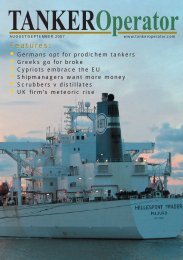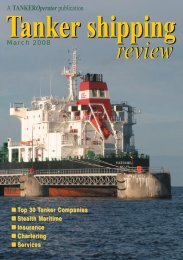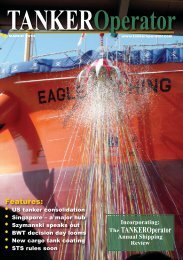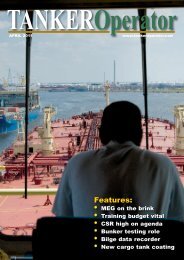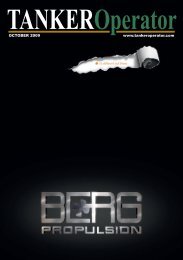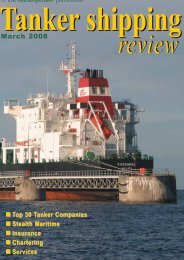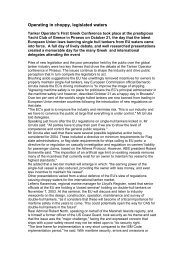Download - Tanker Operator
Download - Tanker Operator
Download - Tanker Operator
Create successful ePaper yourself
Turn your PDF publications into a flip-book with our unique Google optimized e-Paper software.
INDUSTRY - NEWS<br />
Letter to the Editor<br />
Dear Sir,<br />
I have noticed that there is an<br />
increasing demand for tankers<br />
to change their summer<br />
deadweight (and increase the<br />
corresponding freeboard) in<br />
order to be allowed alongside<br />
certain berths - of course this<br />
is a complete nonsense since<br />
the only thing that changes is<br />
some paintwork on the<br />
ship's side.<br />
Regrettably this additional<br />
paintwork is often performed<br />
under far from safe conditions<br />
with sailors working over the<br />
ships side, as for accuracy,<br />
that's anyone's guess. What's<br />
even more regrettable, those<br />
requiring this change<br />
obviously just don't<br />
understand.<br />
It could be argued that<br />
changing deadweight would<br />
make a difference at a loading<br />
terminal, a sort of quasi legal<br />
restraint on the master on how<br />
much he can load, though I've<br />
seldom heard of a vessel<br />
loading more than their<br />
voyage orders dictate. In any<br />
case under most flags, the<br />
master can change the<br />
deadweight and corresponding<br />
freeboard up and down at the<br />
stroke of a pen in the Official<br />
Log Book.<br />
What is even more<br />
ridiculous is that the<br />
deadweight is not even<br />
mentioned on the new, shiny,<br />
normally 'short term' loadline<br />
certificate. I once had the<br />
pleasure of insisting to a<br />
senior class surveyor (to his<br />
absolute horror) that he<br />
amend the deadweight in the<br />
IOPP, Safcon and Safety<br />
Equipment certificates also,<br />
three of the few documents on<br />
a tanker where the deadweight<br />
is officially mentioned.<br />
So, apart from being a nice<br />
little earner for the<br />
classification societies, the<br />
exercise of changing a<br />
tanker's deadweight is, in<br />
reality completely futile.<br />
I have thought about<br />
advocating maximum<br />
displacement as more<br />
suitable restraint to put on a<br />
vessel, but I fear that<br />
concept would be lost on<br />
those most responsible for<br />
this latest craze.<br />
Yours etc,<br />
Capt. Graeme W. McNaught.<br />
MRIN, MNI.<br />
8 Kalypsous<br />
Glyfada<br />
Athens<br />
+30 6937404088<br />
100 % safety – not only<br />
with smooth seas.<br />
Whether tankers, container ships or cruise liners:<br />
SAACKE MARINE SYSTEMS offers made-to-measure burner<br />
and boiler systems for each vessel type, particularly where<br />
safety is all-decisive.<br />
One convincing example is the gas combustion unit (GCU),<br />
especially developed for installation on LNG carriers. This<br />
innovation is space-saving and at the same time extremely<br />
safe, even under most severe conditions.<br />
SAACKE MARINE SYSTEMS – surely as individual as<br />
your fleet.<br />
SAACKE GmbH · Südweststrasse 13 · 28237 Bremen · GERMANY · Phone: +49 - 421 - 64 95 0<br />
Fax: +49 - 421 - 64 95 363 · E-Mail: marine@saacke.de · www.saacke-marine-systems.com<br />
March 2007 • TANKER<strong>Operator</strong> 03


